- Philadelphia 1876
|
At the occasion of the World's Fair held in Philadelphia, Pennsylvania in the United States of America, a number of exhibitions and events were organized to take place during the fair in order to attract foreign interests and representatives to American soil. In addition to many wonderous inventions debuted at the fair, including such curiosities as the telegraph, the telephone, and the typewriter, the 4th US Chess Congress was held. It was the perfect opportunity, not only to attract foreign chess masters but also to celebrate the US centennial. Nine American chess players, some of whom had only taken up residence in the United States only recently, participated in the tournament through registering the $20 entrance fee. The complete list of participants included L.D. Barbour, Henry Edward Bird (originally from England), Harry Davidson, Jacob Elson, Max Judd, Dion Martinez (originally from Cuba), James Mason (originally from Ireland and Great Britain), Albert Roberts, and Preston Ware. Martinez played two of his opponents in both double rounds, but was called back to Cuba when an illness in his family became known to him. His early exit caused his participation from the tournament to be cancelled and his results and games were expunged from the final record. His four games are included in the collection for historical accuracy and completeness. The organization of games and format for timing and pairing were still unstandardized at this time, so players often ended up completing and playing additional games in their pairings on the same day. While the format below does not follow any clear separation of rounds, the dates for each games completion is correct. Play had been scheduled to begin on August 15th, but was delayed to August 16th. All games were played through to August 31st, 1876, with Sundays reserved as rest days. James Mason won the $300 grand prize, as well as the Governor Garland Silver Cup for placing first with ten and a half points out of fourteen in the final. The other prizes went to Judd, who received $200 for second place, Bird, who received $150 for third place, Elson, who received $100 for fourth place, Davidson, who received $50 for fifth place, and Roberts, who received $8 for sixth place. Each place to receive money aside from first also received a gold medal to commemorate their participation. The final standings and crosstable:
1st Mason 10½/14 xx 1½ 10 1½ ½1 1½ 11 ½1 -- 2nd Judd 9/14 0½ xx 00 10 1½ 11 11 11 --
=3rd Davidson 8½/14 01 11 xx ½0 0½ ½1 01 11 -- =3rd Bird 8½/14 0½ 01 ½1 xx 0½ 11 ½1 ½1 -- 5th Elson 8/14 ½0 0½ 1½ 1½ xx ½½ 10 11 -- 6th Roberts 5½/14 0½ 00 ½0 00 ½½ xx 1½ 11 -- 7th Ware 4/14 00 00 10 ½0 01 0½ xx ½½ --
8th Barbour 2/14 ½0 00 00 ½0 00 00 ½½ xx -- --- Martinez 1/4 00 -- ½½ -- -- -- -- -- xx
|
|
58 games, 1876 - Reggio Emilia 1985/86
|
At the end of the year 1985, 12 grandmasters were invited once again to attend the New Year's tournament in Reggio Emilia, Italy. The participants of the round robin event were (in order of ELO): Lajos Portisch (2635), Zoltan Ribli (2615), Ljubomir Ljubojevic (2595), Ulf Andersson (2575), Oleg Romanishin (2570), Lubomir Kavalek (2555), Jan Smejkal (2555), Jesus Nogueiras (2545), Gennady Sosonko (2535), Eric Lobron (2505), Slavoljub Marjanovic (2505), and Miso Cebalo (2485). This edition of the tournament saw a three way tie for first among Andersson, Ljubojevic, and Romanishin with 7/11 each. The final standings and crosstable are as follows: 1 Andersson 7/11 * ½ ½ 1 ½ ½ ½ ½ 1 ½ ½ 1 2 Ljubojevic 7/11 ½ * ½ ½ ½ 0 1 1 1 ½ 1 ½ 3 Romanishin 7/11 ½ ½ * 1 0 ½ ½ ½ ½ 1 1 1 4 Portisch 6.5/11 0 ½ 0 * ½ 1 ½ 1 1 ½ ½ 1
5 Nogueiras 5.5/11 ½ ½ 1 ½ * ½ ½ 1 0 ½ 0 ½ 6 Sosonko 5.5/11 ½ 1 ½ 0 ½ * ½ ½ ½ ½ ½ ½ 7 Kavalek 5/11 ½ 0 ½ ½ ½ ½ * 0 ½ ½ ½ 1
8 Lobron 5/11 ½ 0 ½ 0 0 ½ 1 * ½ 1 1 0
9 Smejkal 5/11 0 0 ½ 0 1 ½ ½ ½ * ½ ½ 1
10 Ribli 4.5/11 ½ ½ 0 ½ ½ ½ ½ 0 ½ * ½ ½ 11 Marjanovic 4.5/11 ½ 0 0 ½ 1 ½ ½ 0 ½ ½ * ½ 12 Cebalo 3.5/11 0 ½ 0 0 ½ ½ 0 1 0 ½ ½ *
|
|
65 games, 1985-1986 - Reggio Emilia 1989/90
|
The 32nd annual international chess tournament held in Reggio Emilia, Italy was held at the end of the year 1989. Eleven grandmasters played in the category XV event from December 28th, 1989 to January 9th, 1990. The participants were (in order of ELO): Anatoli Karpov (2750), Alexander Beliavsky (2640), Vassily Ivanchuk (2635), Zoltan Ribli (2625), Ulf Andersson (2620), Lajos Portisch (2610), Jaan Ehlvest (2600), Kiril Georgiev (2590), Mikhail Gurevich (2590), Nick DeFirmian (2570), and Margeir Petursson (2530). Although four players finished undefeated, it was Jaan Ehlvest who stood out among the field earning wins against half of his opponents to win sole first place, a full point ahead of Ivanchuk. The final standings and crosstable follow: 01 Ehlvest 7.5/10 * ½ ½ ½ ½ 1 1 1 ½ 1 1
02 Ivanchuk 6.5/10 ½ * ½ ½ ½ ½ 1 1 ½ 1 ½ 03 Karpov 6/10 ½ ½ * ½ ½ ½ ½ 1 ½ ½ 1
04 Ribli 5.5/10 ½ ½ ½ * ½ ½ 1 ½ ½ ½ ½
05 Andersson 5.5/10 ½ ½ ½ ½ * ½ ½ 0 1 ½ 1 06 Gurevich 5/10 0 ½ ½ ½ ½ * 0 1 1 ½ ½
07 Georgiev 4.5/10 0 0 ½ 0 ½ 1 * ½ ½ ½ 1
08 Petursson 4.5/10 0 0 0 ½ 1 0 ½ * 1 ½ 1
09 Portisch 4/10 ½ ½ ½ ½ 0 0 ½ 0 * 1 ½
10 DeFirmian 4/10 0 0 ½ ½ ½ ½ ½ ½ 0 * 1
11 Beliavsky 2/10 0 ½ 0 ½ 0 ½ 0 0 ½ 0 *
|
|
54 games, 1989-1990 - Reggio Emilia 1990/91 II
|
Following the conclusion of the world championship at the end of 1990, fourteen of the top sixteen players in the world were invited to compete at the new year's international tournament in Reggio Emilia, Italy. The prestigious A event was divided into two sections: the first called the "top 16" event, and the second called the "top 15" event. The participants of the second, "top 15" event included (in order of ELO): Alexander Beliavsky (2640), Vladimir Epishin (2620), Oleg Romanishin (2610), Ljubomir Ljubojevic (2590), Lajos Portisch (2590), Rafael Vaganian (2585), and Boris Gulko (2575). The average of the combined ratings of the players qualified the tournament as a category XV event. The final of the double round robin saw the ever unpredictable Ljubojevic emerge clear first, having dropped only one game against top seed Beliavsky. Vaganian trailed Ljubojevic by only half a point, having gone undefeated. The final standings and crosstable are as follows: 1 Ljubojevic 7/14 ** ½½ 1½ ½½ ½0 1½ 1½
2 Vaganian 6.5/14 ½½ ** ½½ ½½ ½½ ½½ 1½ 3 Gulko 6.5/14 0½ ½½ ** 01 ½½ 1½ ½1
4 Romanishin 6/14 ½½ ½½ 10 ** 10 ½½ ½½
5 Beliavsky 6/14 ½1 ½½ ½½ 01 ** 00 ½1
6 Epishin 6/14 0½ ½½ 0½ ½½ 11 ** ½½
7 Portisch 4/14 0½ 0½ ½0 ½½ ½0 ½½ **
|
|
42 games, 1991 - Reggio Emilia 1991/92
|
The Reggio Emilia Chess Tournament held in 1991 was a category XVIII event. Ten of the world's upcoming and best players, including the World Champion, competed in a round robin format. The participants were (in order of ELO): Garry Kasparov (2770), Vassily Ivanchuk (2735), Anatoli Karpov (2730), Valery Salov (2665), Alexander Beliavsky (2655), Boris Gelfand (2655), Viswanathan Anand (2650), Mikhail Gurevich (2630), Alexander Khalifman (2630), and Lev Polugaevsky (2630). Anand defeated the World Champion, Kasparov, going on to place first with 6/9. The final standings and crosstable are as follows: 01 Anand 6/9 * 1 = = = = 1 1 0 1
02 Kasparov 5.5/9 0 * = = 1 = = = 1 1
03 Gelfand 5.5/9 = = * = = = 1 = = 1
04 Karpov 5/9 = = = * = 0 = = 1 1
05 Ivanchuk 4.5/9 = 0 = = * 1 = = = =
06 Khalifman 4.5/9 = = = 1 0 * = 0 = 1
07 Polugaevsky 4.5/9 0 = 0 = = = * 1 = 1
08 Salov 4/9 0 = = = = 1 0 * 1 0
09 Gurevich 4/9 1 0 = 0 = = = 0 * 1
10 Beliavsky 1.5/9 0 0 0 0 = 0 0 1 0 *
|
|
45 games, 1991-1992 - Reshevsky's Best Games of Chess, Vol. I
"Reshevsky's Best Games of Chess" (Volume 1). By Samuel Reshevsky. New York: Dover, 1948.
|
|
103 games, 1920-1946 - Reykjavik World Cup 1988
|
The third international chess tournament in a series of six organized by the GMA from 1988 to 1989 as a World Cup was held in Reykjavik, Iceland from October 3rd to the 24th, 1988. Twenty-four of the world's best grandmasters, including the world champion and world vice-champion, were invited to participate in the World Cup, seventeen of them appearing in Reykjavik's category XV event along with one national grandmaster to represent Iceland as host. The complete list of participants was (in order of ELO): Garry Kasparov (2760), Alexander Beliavsky (2665), Jan Timman (2660), Jonathan Speelman (2645), Lajos Portsich (2630), Zoltan Ribli (2630), Ulf Andersson (2625), John Nunn (2620), Artur Yusupov (2620), Johann Hjartarson (2610), Mikhail Tal (2610), Gyula Sax (2600), Andrei Sokolov (2600), Viktor Korchnoi (2595), Predrag Nikolic (2585), Jaan Ehlvest (2580), Boris Spassky (2560), and Margeir Petursson (2530). This tournament was Kasparov's second consecutive World Cup win after his debut in Belfort four months earlier. Despite dropping a game to Sokolov (who had also bested Karpov in his only defeat at Belfort) Kasparov's superior performance was enough to edge out Beliavsky for sole first at 11/17. The final standings and crosstable are as follows: 01 Kasparov 11/17 * = = 1 1 = 1 1 = = 1 0 = = = = 1 = 02 Beliavsky 10.5/17 = * 1 = 1 0 = = 1 = = = 1 = 1 0 = 1 03 Tal 10/17 = 0 * = = = = 1 = 1 = = = 1 1 = = = 04 Hjartarson 9.5/17 0 = = * = = = 1 = = = 0 1 = 0 1 1 1 05 Ehlvest 9.5/17 0 0 = = * = 0 1 = 1 = = 1 = = 1 = 1 06 Yusupov 9/17 = 1 = = = * = = = = = = 0 = = 1 = = 07 Sax 9/17 0 = = = 1 = * = = = = 1 = = 0 = 1 = 08 Timman 9/17 0 = 0 0 0 = = * = = 1 1 1 = = = 1 1 09 Nunn 8.5/17 = 0 = = = = = = * = = = = = 1 = 1 0 10 Speelman 8.5/17 = = 0 = 0 = = = = * = = = 1 = = 1 = 11 Andersson 8.5/17 0 = = = = = = 0 = = * 1 = = = = = 1 12 Sokolov 8/17 1 = = 1 = = 0 0 = = 0 * 0 = = = = 1 13 Nikolic 8/17 = 0 = 0 0 1 = 0 = = = 1 * = = = 1 = 14 Ribli 7.5/17 = = 0 = = = = = = 0 = = = * = = 0 1 15 Portisch 7/17 = 0 0 1 = = 1 = 0 = = = = = * = 0 0 16 Spassky 7/17 = 1 = 0 0 0 = = = = = = = = = * = 0 17 Korchnoi 6.5/17 0 = = 0 = = 0 0 0 0 = = 0 1 1 = * 1 18 Petursson 6/17 = 0 = 0 0 = = 0 1 = 0 0 = 0 1 1 0 *
|
|
153 games, 1988 - Reykjavik World Cup 1991
|
In 1991 the GMA World Cup Chess Tournament was held in Reykjavik, Iceland from September 22nd to October 13th. Sixteen of the world's top grandmasters, including the former World Champion, competed in the round robin event. The participants were (in order of ELO): Vassily Ivanchuk (2735), Anatoli Karpov (2730), Valery Salov (2665), Alexander Beliavsky (2655), Alexander Khalifman (2630), Jonathan Speelman (2630), Jan Timman (2630), Ulf Andersson (2625), Predrag Nikolic (2625), Yasser Seirawan (2615), Murray Chandler (2605), Jaan Ehlvest (2605), Ljubomir Ljubojevic (2600), Lajos Portisch (2570), Boris Gulko (2565), and local favorite Johann Hjartarson (2550). Ivanchuk and Karpov tied for first with an impressive 10.5/15, a point and a half over second place. The final standings and crosstable are as follows: 01 Karpov 10.5/15 * = 0 1 = = 1 1 = 1 = 1 = = 1 1 02 Ivanchuk 10.5/15 = * = 1 = = = = 1 1 = = 1 = 1 1 03 Ljubojevic 9/15 1 = * 0 = 1 = = 1 = = = = 1 = = 04 Khalifman 9/15 0 0 1 * = 1 = 1 = = 1 = = 1 = = 05 Nikolic 9/15 = = = = * = = 1 = = = = 1 = = 1 06 Seirawan 8/15 = = 0 0 = * = = = 1 1 = = 1 = = 07 Speelman 7.5/15 0 = = = = = * 1 = = = 0 = 1 = = 08 Ehlvest 7.5/15 0 = = 0 0 = 0 * 1 = 1 1 1 = = = 09 Portisch 7/15 = 0 0 = = = = 0 * = = = 1 = = 1 10 Salov 7/15 0 0 = = = 0 = = = * 1 1 1 0 1 0
11 Beliavsky 7/15 = = = 0 = 0 = 0 = 0 * = 1 1 = 1 12 Hjartarson 6.5/15 0 = = = = = 1 0 = 0 = * = = = = 13 Chandler 5.5/15 = 0 = = 0 = = 0 0 0 0 = * = 1 1 14 Timman 5.5/15 = = 0 0 = 0 0 = = 1 0 = = * = = 15 Andersson 5.5/15 0 0 = = = = = = = 0 = = 0 = * = 16 Gulko 5/15 0 0 = = 0 = = = 0 1 0 = 0 = = *
|
|
120 games, 1991 - Richard Réti's Best Games by Golombek
|
The games and compositions collected here are from Harry Golombek's book "Richard Réti's Best Games." Since the compositions could not be included in order with the games below they follow this tournament introduction: Compositions:
Endgame Study p.80
Kagan's Neueste Schachnachrichten, 1921

click for larger view
----------White to play and draw----------
Endgame Study p.100
Teplitz-Schonauer Anzeiger, 1922

click for larger view
----------White to play and win----------
Endgame Study p.101
Kagan's Neueste Schachnachrichten, 1922

click for larger view
----------White to play and win----------
Endgame Study p.101
Hastings and St. Leonards Post, 1922

click for larger view
----------White to play and win----------
Endgame Study p.130
Berliner Tageblatt, 1923

click for larger view
----------White to play and win----------
Endgame Study p.130
Casopis ceskoslovenskych sachistu, 1924

click for larger view
----------White to play and win----------
Endgame Study p.152
Wiener Tageblatt, 1925
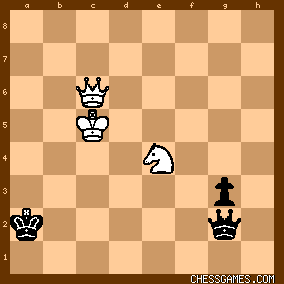
click for larger view
----------White to play and win----------
Endgame Study p.152
28 Rijen, 1925

click for larger view
----------White to play and win----------
Endgame Study p.173
Shakhmatny Listok, 1927

click for larger view
----------White to play and win----------
Endgame Study p.173
Shakhmatny Listok, 1927
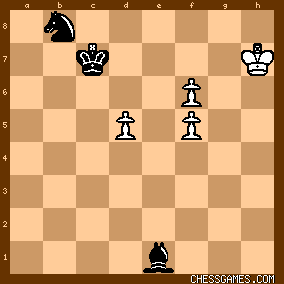
click for larger view
----------White to play and draw----------
Endgame Study p.196
Magyar Sakkvilág, 1928
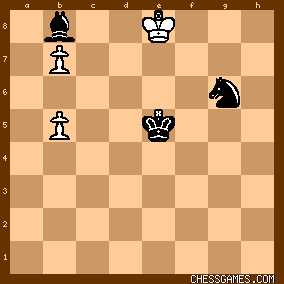
click for larger view
----------White to play and draw----------
Endgame Study p.197
Narodni Listy, 1928
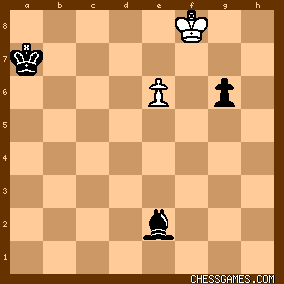
click for larger view
----------White to play and draw----------
Endgame Study p.197
Denken und Raten, 1928

click for larger view
----------White to play and win----------
Endgame Study p.197
Shakhmaty, 1928

click for larger view
----------White to play and win----------
Endgame Study p.198
Koelnische Volkszeitung, 1928 [Reti & H. Rinck (1935)]
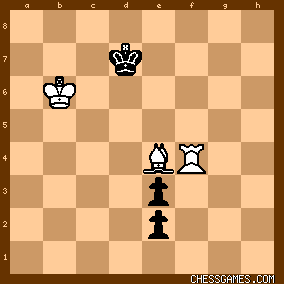
click for larger view
----------White to play and win----------
Endgame Study p.198
Munchner Neuiste Nachrichten, 1928
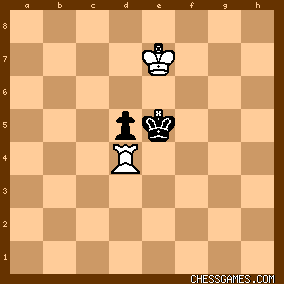
click for larger view
----------White to play and win----------
Endgame Study p.198
Shakhmaty, 1929

click for larger view
----------White to play and win----------
Endgame Study p.199
Magyar Sakkvilág, 1929
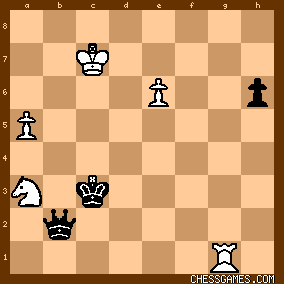
click for larger view
----------White to play and win----------
Endgame Study p.199
Basler Nachrichten, 1929
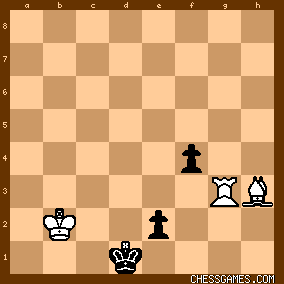
click for larger view
----------White to play and win----------
Endgame Study p.199
Ostrauer Morgenzeitung, 04.1929

click for larger view
----------White to play and draw----------
|
|
70 games, 1907-1928 - Riga 1995
|
The 1st International Tal Memorial Chess tournament was held in the magician's hometown of Riga, Latvia from April 12th to the 24th, 1995. It was the first tournament in a series of three organized by the PCA that year as a "Super Classic." The following two tournaments were held in Novgorod at the end of May, and Horgen after the completion of the PCA world championship match. Eleven grandmasters, including the world champion, were invited to compete in the round robin event. The participants were (in order of PCA rating): Garry Kasparov (2789), Vassily Ivanchuk (2764), Vishwanathan Anand (2758), Vladimir Kramnik (2713), Artur Yusupov (2676), Jaan Ehlvest (2669), Rafael Vaganian (2645), Boris Gulko (2623), Nigel Short (2617), Jan Timman (2615), and local favorite Edvins Kengis (2555). The tournament was an important victory for Kasparov, who had not managed such a convincing win in an elite event against Anand (or Anatoli Karpov) since Linares in 1993. Especially significant was Kasparov's win against Anand in the fourth round since Anand was obviously in top form and their world championship match was only in five months. Kasparov scored an impressive 75% and edged out Anand by half a point in the final. The final standings and crosstable are as follows: 01 Kasparov 7.5/10 * 1 = = = = 1 = 1 1 1
02 Anand 7/10 0 * = = = 1 = 1 1 1 1
03 Ivanchuk 6.5/10 = = * = 1 = = 1 1 = =
04 Kramnik 6/10 = = = * = = = 1 1 = =
05 Short 6/10 = = 0 = * = = 1 = 1 1
06 Gulko 5/10 = 0 = = = * = = = = 1
07 Yusupov 4.5/10 0 = = = = = * = = = =
08 Ehlvest 3.5/10 = 0 0 0 0 = = * = 1 =
09 Kengis 3/10 0 0 0 0 = = = = * = =
10 Timman 3/10 0 0 = = 0 = = 0 = * =
11 Vaganian 3/10 0 0 = = 0 0 = = = = *
|
|
55 games, 1995 - Road to the Championship - Anatoli Karpov
This is the road taken by Karpov during his title run. Karpov was seeded directly into the 1973 Leningrad Interzonal as World Junior Champion. He tied for first with Viktor Korchnoi, but was declared the winner on tiebreaks having gone undefeated. During this time Karpov would also take first in Madrid with an impressive 11/15. Karpov went undefeated again in the quarterfinals match against Lev Polugaevsky, and trounced the former world champion, Boris Spassky, in the semi-finals 7-4. Karpov was eventually victorious over Korchnoi in the candidates final with a score of 12.5-11.5 after a grueling 24 game match that saw 19 draws. When Fischer and FIDE refused to come to an agreement about the terms for the world championship match in 1975 Karpov was declared the de facto World Champion, making his the shortest of all title runs under the classic FIDE cycle. Special thanks to Fischer of Men for the collection idea and format.
|
|
60 games, 1973-1974 - Road to the Championship - Boris Spassky
This is the road taken by Spassky during his title run. There are two candidates and world championship matches included as Spassky was unsuccessful during his first run, but automatically seeded into the '68 Candidates match as a result. Spassky placed first in the 31st USSR Championship finishing just half a point ahead of Leonid Stein and David Bronstein, both of whom tied for second. It was during this tournament that Spassky earned the nickname "comeback kid," for winning the Zonal after a disappointing start of 1 point after the first four rounds. Spassky went on to tie for first with Mikhail Tal, Vasily Smyslov, and Bent Larsen at the Amsterdam Interzonal, and emerged victorious against the former world champion in the Candidates Final with a score of 6 points to Tal's 4. Spassky barely lost his first world championship match against Tigran Petrosian 11.5-12.5, but he managed to win the Second Piatigorsky Cup just a few months after, edging ahead of both Fischer and Larsen. "Comeback kid" would be prophetic as Spassky returned to trounce the competition at the 1968 Candidates match (he crushed Efim Geller without a single loss and scored three points better than both Larsen and Korchnoi), and went on to defeat Petrosian 12.5-10.5 in the rematch.
Thanks to Fischer of Men for the collection idea and format, and special thanks to Offramp for filling in all the zonal games for me.
|
|
137 games, 1964-1969 - Road to the Championship - Mikhail Botvinnik
This is the road taken by Botvinnik during his title run. Botvinnik's road was neither short nor easy in spite of the 39 games collected below. This is due to the fact that Botvinnik began his journey for the world championship back in the 1930s before there was an official cycle for determining a challenger for the world champion. In order to provide the Soviet Union with enough assurances for funding a proposed match with the world champion, Botvinnik had to become the best possible player he could. This meant winning the Soviet Championship in 1931 and in 1933. He also won important international events to show that he could defeat non-Soviets for the crown. Results such as his shared first with Capablanca over Max Euwe and Alexander Alekhine at Nottingham 1936, shared first with Salomon Flohr at Moscow 1935, and clear second behind Capablanca at Moscow 1936 all went a long way to establishing Botvinnik as not only the best in the Soviet Union, but the best in the world. The Soviet Championship of 1940 became the final proving ground for the selected challenger, but Botvinnik finished fifth. A six man playoff in 1941, organized for the challenger spot, dubbed the "absolute championship," saw Botvinnik finally emerge as winner. However, World War II provided another setback and Botvinnik would have to wait until 1946 for his chance. In the meantime, winning Sverdlovsk in 1943, and the Soviet championships in 1944 and 1945 kept Botvinnik at the top of his form and firmly established him as the best player to back for a title shot. Unfortunately, Alekhine died in 1946, and so Botvinnik, along with Soviet backing, began working with FIDE to found and maintain an official cycle for determining a challenger for the world championship. Botvinnik's participation in the Groningen tournament of 1946, where he finished clear first a half point ahead of ex-world champion Max Euwe, kept the Dutchman from reclaiming the crown as well as insuring his spot in the proposed world championship tournament to be organized the following year. Delays pushed the tournament back to 1948, and Botvinnik, in fury at the newest setback, withdrew from the 1947 Soviet Championship (which gave Paul Keres a chance to earn his spot in the 1948 WC--since his participation had been withheld from Groningen 1946--as the clear winner of that championship), but regained his composure to participate in the Chigorin Memorial held in Moscow at the end of 1947. His clear first and dominance over the international field kept him prepared and focused for the final confrontation. Botvinnik was one of the six best players in the world invited to the world championship tournament held in The Hague, the Netherlands, and Moscow in the Soviet Union. He faced two of his fellow countrymen, Vasily Smyslov and Paul Keres, as well as Euwe and Samuel Reshevsky from the United States (Reuben Fine had declined his invitation). At the final, Botvinnik finished clear first with +8, dropping only two games, and beating second place Smyslov by three whole points to become the sixth world chess champion. Thanks go to <Fischer of Men> for the collection idea and format.
|
|
39 games, 1946-1948 - Road to the Championship - Tigran Petrosian
This is the road taken by Petrosian during his title run. Any games decided by forfeit are not included. Petrosian placed first in the 28th USSR Championship, but tied for second--compared to Fischer's crushing first--in the Stockholm Interzonal with Geller, Korchnoi, and Filip. He emerged the victor over the Candidates Tournament in Curacao, much to Fischer's chagrin (he accused the Russians of cheating, conspiring to keep him out of the championship match). During this time, Petrosian proved virtually unbeatable (losing only one zonal game in the sixth round to Stein) before meeting Botvinnik in the first round. Special thanks to Fischer of Men for the collection idea and format, and special thanks also to Benzol, Poohavez, and sneaky pete for all their help filling in the zonal games for me.
|
|
90 games, 1961-1963 - Road to the Championship - Vasily Smyslov
This is the road taken by Smyslov during his title run. Smylov had one of the longest roads as challenger for the world championship crown, almost twelve years, although it was also one of the most privileged. There are four candidates tournaments and three world championship matches included as Smyslov was not successful on his first three attempts, but enjoyed automatic seeding into each candidates tournament of the cycle due to his results. Smyslov was chosen as one of the six best in the world to compete in the 1948 World Championship Tournament at The Hague and Moscow based on his clear third at Groningen in 1946, which was chosen as an impromptu candidates tournament. Smyslov finished clear second behind the new world champion, Mikhail Botvinnik, which seeded him directly into the 1950 Candidates tournament in Budapest, where he scored clear second again behind David Bronstein and Isaac Boleslavsky. As a result, Smyslov was seeded again directly into the 1953 Candidates tournament in Zurich where he finished clear first against one of the strongest fields ever seen in tournament play. Despite numerous wins and long fought battles, Smyslov was only able to tie Botvinnik in the 1954 World Championship Match. In 1956 Smyslov, as the reigning challenger, found himself seeded directly into his third candidates tournament, this time in Amsterdam. He finished clear first again, two points ahead of Paul Keres and Efim Geller. Third time proved the charm for Smyslov as he soundly defeated Botvinnik by three points in their rematch for the crown. Thanks to Fischer of Men for the collection idea and format, and special thanks to Resignation Trap and WannaBe for filling in all the Groningen Tournament games for me.
|
|
149 games, 1946-1957 - Rotterdam 1931
|
The Dutch city of Rotterdam hosted a four-man vierkamp tournament in December of 1931. Among the participants were Edgar Colle of Belgium, Salo Landau of the Netherlands, Akiba Rubinstein of Poland, and Savielly Tartakower of France. The chess masters played double rounds (vierkamp) in what was a surprising upset of expectations. Landau, originally from Poland until his family resettled him in Rotterdam, finished clear first with wins against every other opponent. It was his first notable tournament victory and he would go on to be Dutch champion five years later. This proved to be one of Colle's last best performances in an international event since he would die from complications involving surgery five months later. Tartakower and Rubinstein both finished in the bottom of the standings which must have been surprising to the majority of spectators who were used to their exemplary chess play. The final standings and crosstable:
1st Landau 4/6 ** 11 10 01
2nd Colle 3½/6 00 ** 1½ 11
3rd Tartakower 2½/6 01 0½ ** 10
4th Rubinstein 2/6 10 00 01 **
|
|
12 games, 1931 - Rotterdam VSB 1990
|
The fourth Max Euwe Memorial Chess Tournament was organized by the Verenigde Spaarbank in Rotterdam, the Netherlands from May 10th to the 17th, 1990. Following the format of previous editions of the memorial, four of the world's top grandmasters were invited to play in the double round robin event. As before, adjourned games were completed on the rest days occuring after the third and fifth rounds, and the time control for the tournament was forty moves in two hours followed by an additional hour for each twenty moves after that. This year's line-up included three Euwe memorial veterans and one new addition. The participants were (in order of ELO): Dutch grandmaster and previous Euwe memorial champion Jan Timman (2680); Soviet grandmaster Mikhail Gurevich (2645); British grandmaster and winner of the 2nd Euwe memorial Nigel Short (2630); and Swiss grandmaster and inaugural memorial participant Viktor Korchnoi (2625). The average of the combined ratings of the players ranked this event as a category XVI tournament. The move to Rotterdam was hoped to capitalize on the world cup tournament in the city last year, but it was ultimately deemed fruitless and the Euwe memorial would be moved back to Amsterdam the following year. Gurevich came to win the event, but Korchnoi edged him out by winning their fourth round encounter in a significant position in the Dutch Leningrad. Korchnoi won clear first having gone undefeated with Gurevich trailing second just half a point behind in the final. The final standings and crosstable are as follows: 1 Korchnoi 4/6 ** ½1 ½½ 1½
2 Gurevich 3.5/6 ½0 ** 1½ ½1
3 Timman 3/6 ½½ 0½ ** ½1
4 Short 1.5/6 0½ ½0 ½0 **
|
|
12 games, 1990 - Rotterdam World Cup 1989
|
The fifth international chess tournament in a series of six organized by the GMA from 1988 to 1989 as a World Cup was held in Rotterdam, The Netherlands from June 3rd to the 24th, 1989. Twenty-four of the world's best grandmasters, including the world champion and world vice-champion, were invited to participate in the World Cup, seventeen of them appearing in Rotterdam's category XV event along with one national grandmaster to represent The Netherlands as host. The complete list of participants was (in order of ELO): Anatoli Karpov (2750), Nigel Short (2650), Valery Salov (2630), John Nunn (2620), Johann Hjartarson (2615), Lajos Portisch (2610), Gyula Sax (2610), Yasser Seirawan (2610), Jan Timman (2610), Artur Yusupov (2610), Andrei Sokolov (2605), Jaan Ehlvest (2600), Robert Huebner (2600), Rafael Vaganian (2600), Ljubomir Ljubojevic (2580), Boris Spassky (2580), Jesus Nogueiras (2575), and John Van der Wiel (2560). Spassky dropped out of the tournament before the draw, while Huebner withdrew during the tournament, after his first round draw to Nogueiras. His game and standing were subsequently expunged. The event was a triumph for the Dutch grandmasters, as Jan Timman overcame Karpov by a full point to take first place at the final, despite losing in their head-to-head game. John Van der Wiel, who had joined to represent The Netherlands, also finished way ahead of his rated seeding, finishing tied for fifth place just behind the leaders. The final standings and crosstable are as follows: 01 Timman 10.5/15 * 0 = 1 = 1 = 1 1 1 = 1 = = = 1 02 Karpov 9.5/15 1 * = 0 = 0 = = = 1 1 1 1 0 1 1 03 Vaganian 9/15 = = * = 1 = = = = 1 0 1 1 = = = 04 Nunn 8.5/15 0 1 = * = = = = = = = = = 1 = 1
05 Van der Wiel 8/15 = = 0 = * 0 1 = 1 = = = = = 1 = 06 Salov 8/15 0 1 = = 1 * 0 = 1 0 1 = 0 = = 1
07 Ehlvest 8/15 = = = = 0 1 * = 0 = 1 0 = 1 = 1 08 Sokolov 8/15 0 = = = = = = * 0 = = = 1 = 1 1 09 Short 7.5/15 0 = = = 0 0 1 1 * 1 = 0 1 = = = 10 Seirawan 7/15 0 0 0 = = 1 = = 0 * = = = 1 1 = 11 Sax 6.5/15 = 0 1 = = 0 0 = = = * = = = = =
12 Nogueiras 6.5/15 0 0 0 = = = 1 = 1 = = * = = 0 = 13 Yusupov 6.5/15 = 0 0 = = 1 = 0 0 = = = * 1 = = 14 Ljubojevic 6/15 = 1 = 0 = = 0 = = 0 = = 0 * = = 15 Portisch 6/15 = 0 = = 0 = = 0 = 0 = 1 = = * = 16 Hjartarson 4.5/15 0 0 = 0 = 0 0 0 = = = = = = = * *Thanks go to <Chessdreamer> without whom this collection wouldn't have been possible.
|
|
120 games, 1989 - Salzburg 1942
|
During World War II, Nazi Germany organized several chess tournaments played in German and occupied cities, such as Munich and Prague. The strongest and most famous of these Nazi organized tournaments was played in Salzburg, Austria in the summer of 1942. The original line up of players for the tournament included then-current world champion Alexander Alekhine, former world champion Max Euwe, potential challenger Paul Keres, former challenger Efim Bogoljubov, German champion Paul Felix Schmidt, and Gosta Stoltz, winner of the Munich tournament in 1941. It was the strongest line up of players possible from Germany and the occupied territories, but it was not to be realized as Max Euwe declined to attend, citing poor health. Erhardt Post, the main organizer of the event, replaced Euwe with eighteen year old Klaus Junge, the winner of the silver medal during the previous year's German championship. The tournament was held at Mirabell Palace, situated near Berchtsgaden, which was Hitler's summer residence. Games were played from June 9th to the 18th and started promptly at 9am each day. Players had two hours to play the first thirty-two moves followed by an hour for every sixteen moves. Despite a first half lead of the field, Bogoljubov fell apart after his loss to Alekhine in round six and proceeded to lose all his remaining games. Alekhine emerged triumphant with an impressive score of seven and a half points out of ten, a full point and a half ahead of second place Keres. The final standings and crosstable:
1st Alekhine 7½/10 ** 11 01 11 01 ½1
2nd Keres 6/10 00 ** 1½ ½½ ½1 11
=3rd Junge 5/10 10 0½ ** ½½ 01 ½1
=3rd Schmidt 5/10 00 ½½ ½½ ** 01 11
5th Bogoljubov 3½/10 10 ½0 10 10 ** 00
6th Stoltz 3/10 ½0 00 ½0 00 11 **
*Thanks to <Benzol> for his help putting the finishing touches on this game collection.
|
|
30 games, 1942 - San Antonio 1972
|
In 1972, while the world's gaze was fixed on Iceland, a company in America had plans to generate publicity for itself through the chess world. Church's Fried Chicken, a restaurant chain in the United States, organized an international tournament to be held in San Antonio, Texas. European and Soviet grandmasters were pitted against grandmasters and masters from the Americas in a round robin format. The sixteen participants were (in order of ELO): Tigran Petrosian (2645), Lajos Portisch (2640), Anatoli Karpov (2630), Bent Larsen (2625), Vlastimil Hort (2600), Paul Keres (2600), Svetozar Gligoric (2575), Henrique Mecking (2570), Larry Evans (2545), Walter Shawn Browne (2530), Donald Byrne (2470), Julio Kaplan (2470), Duncan Suttles (2470), Dr. Anthony Saidy (2425), Ken Smith (2395), and Mario Campos Lopez (2200). The tournament ended with a trifecta finish, with the top three seeds sharing first place. The finals standings and crosstable are as follows: 01 Portisch 10.5/15 * ½ 1 0 1 1 ½ ½ 1 ½ ½ ½ 1 ½ 1 1 02 Petrosian 10.5/15 ½ * ½ 1 ½ ½ ½ 1 1 ½ ½ ½ ½ 1 1 1 03 Karpov 10.5/15 0 ½ * 1 ½ ½ 1 ½ ½ 1 ½ 1 ½ 1 1 1 04 Gligoric 10/15 1 0 0 * ½ ½ 1 ½ ½ 1 ½ 1 ½ 1 1 1 05 Keres 9.5/15 0 ½ ½ ½ * 1 ½ 1 1 1 0 ½ ½ 1 1 ½ 06 Hort 9/15 0 ½ ½ ½ 0 * ½ 1 0 ½ ½ 1 1 1 1 1 07 Suttles 9/15 ½ ½ 0 0 ½ ½ * ½ ½ ½ 1 ½ 1 1 1 1 08 Mecking 8.5/15 0 ½ 0 ½ ½ 0 0 ½ * 1 ½ ½ 1 1 1 ½ 1 09 Larsen 8.5/15 0 0 ½ ½ 0 1 ½ 0 * 1 1 0 1 1 1 1 10 Byrne 7/15 ½ ½ 0 0 0 ½ ½ ½ 0 * 1 0 ½ 1 1 1 11 Evans 6.5/15 ½ ½ ½ ½ 1 ½ 0 ½ 0 0 * ½ 0 ½ ½ 1 12 Browne 6.5/15 ½ ½ 0 0 ½ 0 ½ 0 1 1 ½ * 1 0 0 1 13 Kaplan 5/15 0 ½ ½ ½ ½ 0 0 0 0 ½ 1 0 * 1 ½ 0 14 Campos Lopez 3.5/15 ½ 0 0 0 0 0 0 0 0 0 ½ 1 0 * 1 ½ 15 Saidy 3.5/15 0 0 0 0 0 0 0 ½ 0 0 ½ 1 ½ 0 * 1 16 Smith 2/15 0 0 0 0 ½ 0 0 0 0 0 0 0 1 ½ 0 *
|
|
119 games, 1972
|



